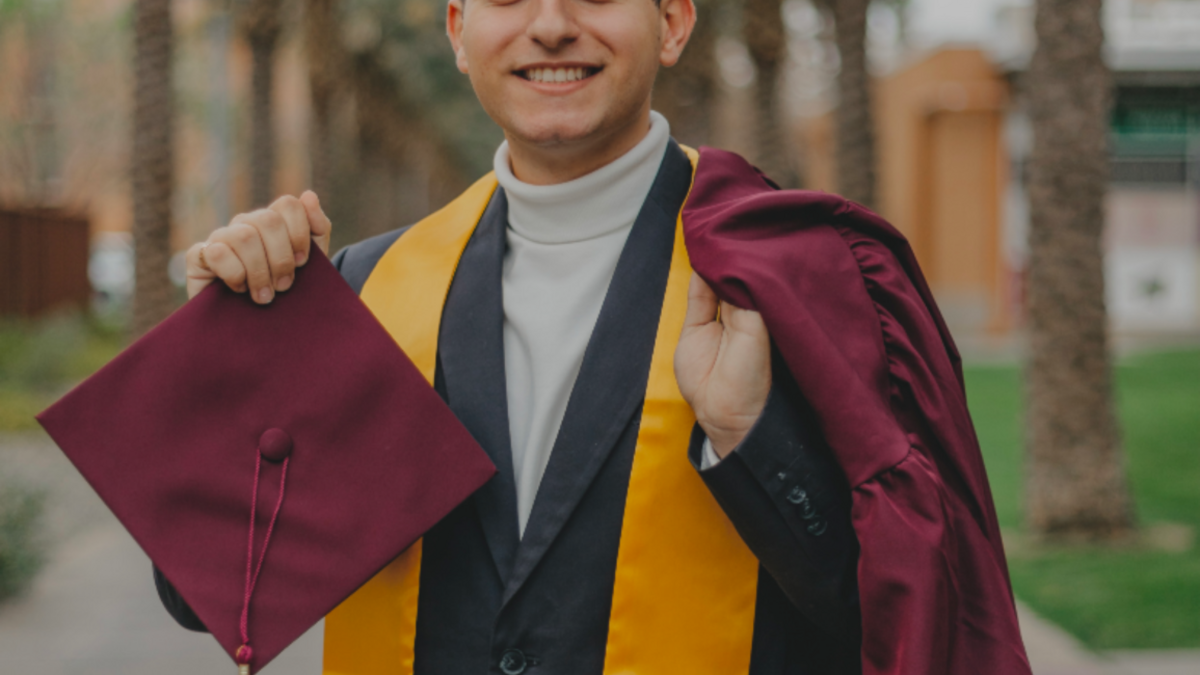Editor's note: This story is part of a series of profiles of notable spring 2021 graduates.
While at ASU, computer science major John Gebara discovered his true potential. After reflecting on all that he has balanced throughout college — his coursework, jobs, extracurricular activities and relationships with friends and family — he realized that he is capable of more than he thought.
“It is a lot for one person, and to reflect on how much you have put on your plate and how far you have come will genuinely surprise you and make you realize you are so much more capable than you know,” he said.
He offers this advice to current and future students: “Take every chance to invest in yourself and your knowledge and it will be returned twofold.”
Gebara, who grew up in Gilbert, Arizona, graduates this May with a degree in computer science with a concentration in software engineering from the Ira A. Fulton Schools of Engineering.
In high school, Gebara determined he wanted to gain knowledge in computer science and software engineering while he was working on applications for Lowell Observatory in his STEM class.
“Having the opportunity to watch these apps grow out of nothing made me realize that I wanted to be able to create and make something that people can use and learn from,” he said.
Gebara recently worked on a Product Acceptance Review Tool Generator at his current job with Iridium Satellite Communications. He was able to work alongside senior engineers who helped mentor and guide him through the process of programming.
Outside of his engineering coursework, Gebara participated in many extracurricular activities during his time at ASU. As a Medallion Scholar, he was able to develop leadership skills and volunteer with others in the Medallion program. Gebara received the ASU Alumni Association Medallion Scholarship all four years, as well as the New American University Scholarship.
Some of his favorite memories from the program were times where he was able to bond with his cohort, such as going to restaurants after meetings and volunteer events.
“We really bonded and moved from being just fellow scholars to friends,” he said.
Gebara also was involved throughout his time as a Sun Devil in Camp Kesem, a national nonprofit devoted to supporting children who have been impacted by a parent having cancer. His junior year, he joined Dabke United, a student organization that strives to preserve Middle Eastern culture through dabke, a traditional dance.
Gebara shared his not-so-secret thoughts on his favorite spot on the Tempe campus.
“My favorite spot on campus is the Secret Garden,” he said. “It is such a beautiful and serene place and as much as I loved going there to study or relax, I made it a point to not go as often as I would like because I wanted to preserve the magic of the Secret Garden and keep it special and leave it empty for the next amazing person that just needs a small getaway from the crazy campus life.”
As a Lebanese American, Gebara’s Middle Eastern background has always been important to him. He struggled finding others in his life who shared his heritage and learned an important lesson in an Arabic course at ASU.
“We are all connected, not as Middle Eastern Americans, but as humans, and we should all treat each other with the utmost respect, compassion and empathy,” he said. “This is a common lesson we are all taught as children, and yet in our modern society it is scarce, so (my Arabic professor) taught us to be the change we want to see in the world by turning a simple Arabic lesson into a team-bond lesson.”
Gebara will pursue his passions after graduation this May as he begins his career as a full-time software engineer at Iridium Satellite Communications.
More Science and technology

Will this antibiotic work? ASU scientists develop rapid bacterial tests
Bacteria multiply at an astonishing rate, sometimes doubling in number in under four minutes. Imagine a doctor faced with a…

ASU researcher part of team discovering ways to fight drug-resistant bacteria
A new study published in the Science Advances journal featuring Arizona State University researchers has found…

ASU student researchers get early, hands-on experience in engineering research
Using computer science to aid endangered species reintroduction, enhance software engineering education and improve semiconductor…
